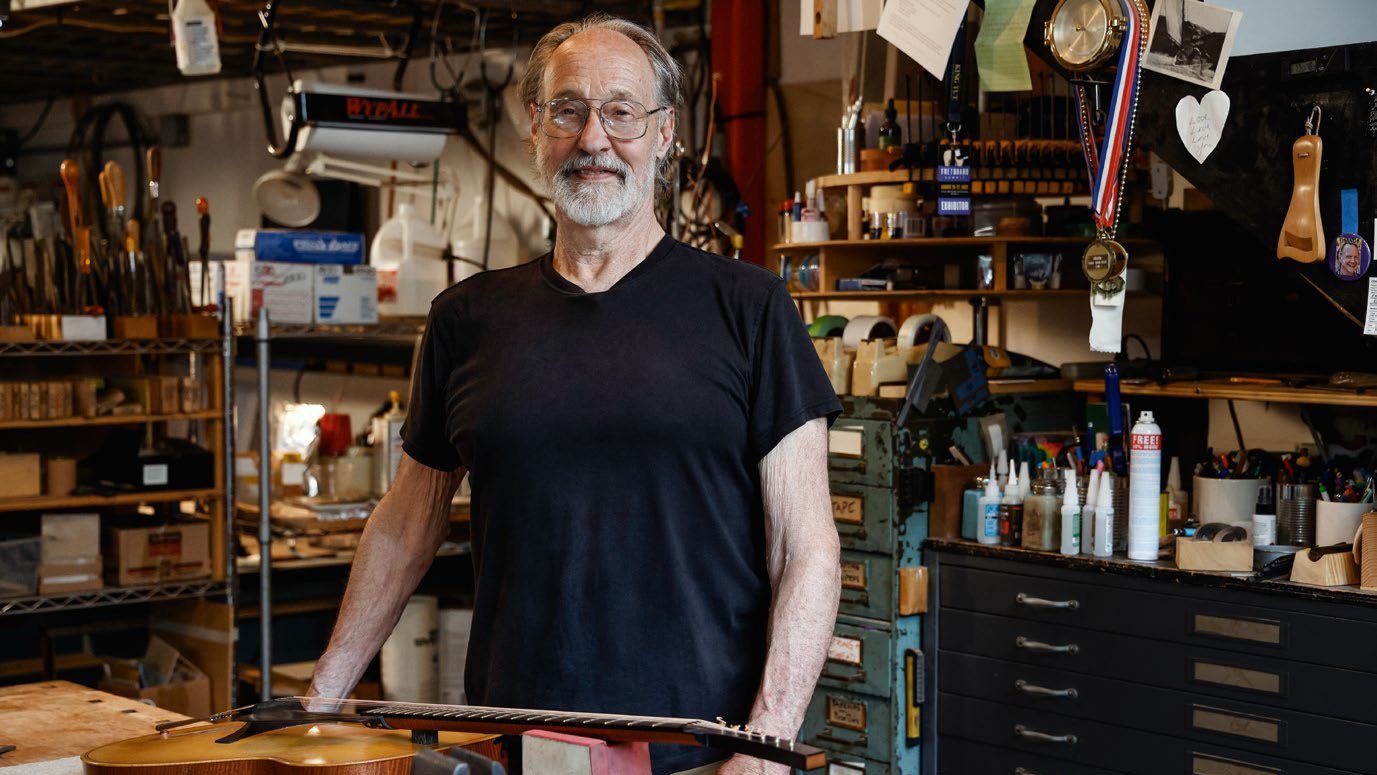Jon Gomm: “It doesn’t matter how crazy your technique is, the hardest thing is always playing in time and in tune“
The maestro returns with new music that healed him in hard times and reflects on his status as one of today's leading percussive guitarists

Jon Gomm can play guitar. We know this. Since his debut album, Hypertension, sparked the tap ’n’ slap acoustic sub-genre back in 2003, Gomm’s polyrhythmic dexterity has been so well established that the Blackpool-born wizard can spare the fireworks and give himself over entirely to songcraft on his 2020 album, The Faintest Idea.
Well, almost, that is. Because while The Faintest Idea is first and foremost a songwriting masterclass – with Gomm exploring the beauty and pain of life’s travails – it hasn’t stopped him casually ripping up accepted truths of acoustic technique along the way, with a slew of sounds-like-six-hands guitar parts. “I’ve just always got that itch at the back of my mind,” he says, “where I’m thinking, ‘I wonder how I could play that…?’”
How pleased are you with The Faintest Idea?
“There’ll always be times my critical mind won’t switch off. But I can listen to the album and feel proud. Y’know, there are moments it’s hard to listen to, emotionally. I’ve lost a couple of friends and close family in the last few years. So there’s music here that’s helped me express that.
“I’ve also had a daughter and that’s changed how I look at the world. I used to separate myself off and tried to maintain my own little isolated universe. But with a loss or a birth, you realise you’re really connected to other people and you can’t avoid that.”
The song Deep Sea Fishes on the album has a more unusual inspiration, though, doesn’t it?
“Yeah. I was watching a nature documentary about fish down at the bottom of the ocean. It’s really bleak in that environment. No light, no plants, almost no life. Just these hideous sea monsters, creeping around, completely alone, blind. I became quite depressed watching it.
All the latest guitar news, interviews, lessons, reviews, deals and more, direct to your inbox!
“But then I figured out, they must have come from somewhere. There must be a daddy hideous sea monster and a mummy hideous sea monster, and they must fall in love and make little baby hideous sea monsters. So I wrote a love song.”
Steve Lukather actually sent me a message saying, ‘I’ve always known there’s a secret shredder inside that emotional singer-songwriter persona‘
Do you have favourite guitar moments in your songs?
“There’s loads going on with the percussion and bass and melody. But my favourite ‘riff’ is on Universal Biology, which is a kind of slow harmonic minor metal groove. There’s a melody and counter-melody happening, a pretty complete drum part and vocals, and they’re all played at once.
“Deep Sea Fishes has a proper solo, with these fast arpeggios that are basically sweep-picking licks, but because I’m playing drums with my right hand they’re all played legato. I can actually sweep-pick. So to have spent countless hours learning that and then, finally, when I have a sweep-picking lick on an album, it’s pretend – that’s hilarious. Steve Lukather actually sent me a message saying, ‘I’ve always known there’s a secret shredder inside that emotional singer-songwriter persona.’”
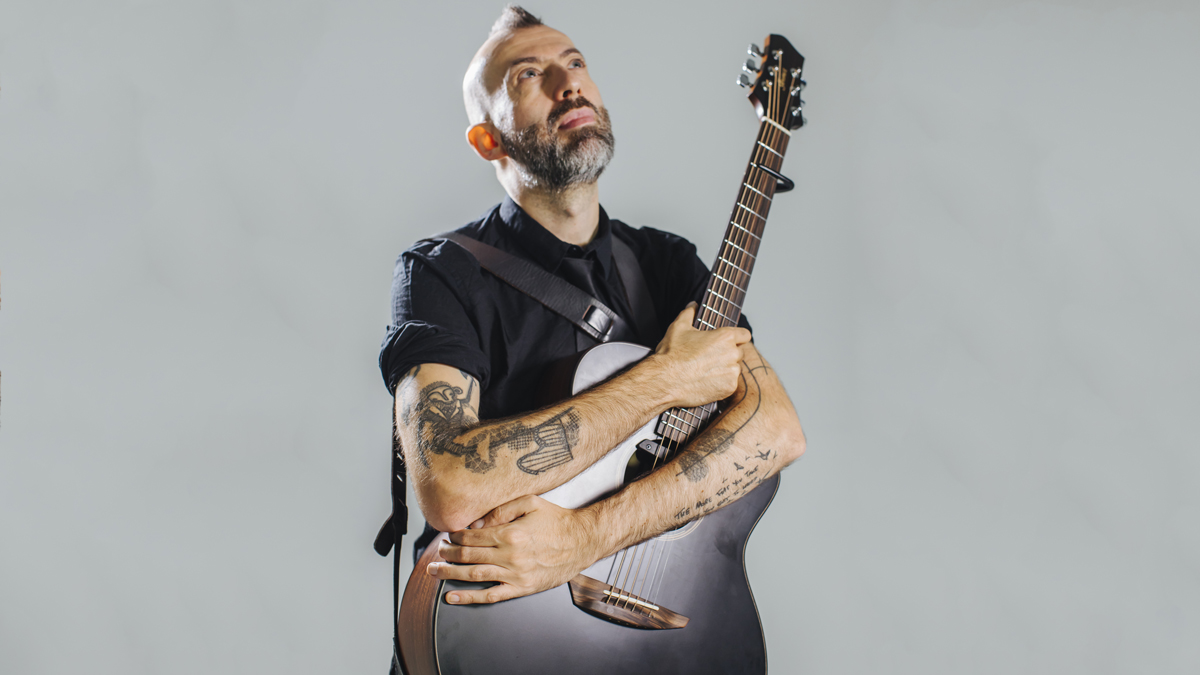
Did you do anything for the first time on this album?
“Yeah, there’s new tunings and techniques I’ve come up with. I mean, I say I’ve ‘come up’ with them – who knows who invented what? I was one of those guitarists who ‘invented’ the pentatonic scale.
“When I was a kid, I was learning blues licks and realised they fell into this pattern. I remember thinking, ‘Wow, wait until people hear about this!’ But, yeah, quite often, I’ll write things I can’t play. So I then have to really woodshed. There isn’t a song on the album that’s easy. They’re all a nightmare in one way or another…”
What’s the hardest guitar part?
“Well, there’s a song called Until The Sun Destroys The Earth. It starts off with a simple strumming part. But then there’s soloing over the top – all tapped stuff, really high up on the bass strings. It’s hard work, y’know? I’m deliberately not releasing a video for that one until the album is out. Because when people see me play it, they’re gonna be shocked that it’s all played on one guitar!”
I was very clear that, okay, we could use synthetic sounds – but no synthetic beats of any kind, because it’s my job to do those on the guitar…
You mentioned new tunings…
“That particular song is in CGCGBC. I’ve never used that tuning before, but it’s basically a big C powerchord. Deep Sea Fishes is B F# D# F# Bb C#, which sounds evil, but it’s actually quite a pretty chord. So many guitarists are scared of tunings, because they’ve spent so much time learning their scales.
“Y’know, I went to The Guitar Institute, I’ve got a jazz degree, I’m one of those guitarists who knows his way around in standard tuning. But the only thing you lose if you retune is your ability to noodle. It’s a really bad tendency.
“It can become what you’re known for. I’d encourage people to think about the music you truly love – and how much of that consists of improvised guitar soloing. Probably, the amount is quite small.”
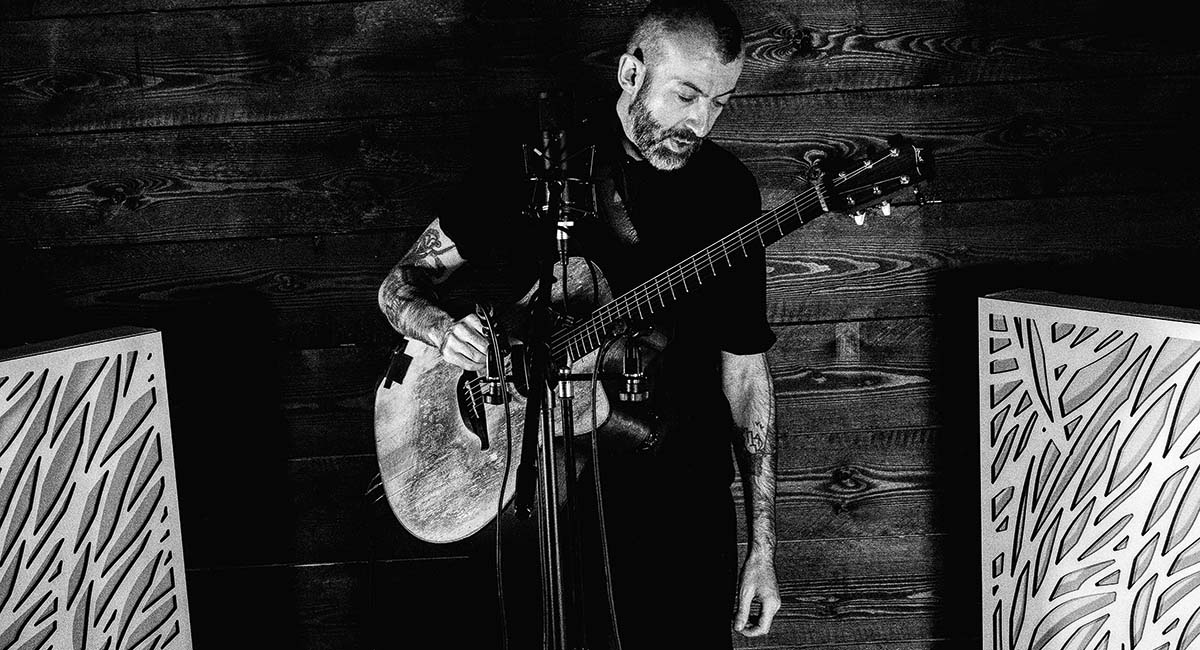
The new album combines your acoustic with the synth work of your producer, Andy Sorenson…
“For me, it’s an obvious match. Because there’s things the acoustic can’t do, sonically. Like, gaps in the frequency range. It can be very hollow in the midrange, for example. You can’t sustain a chord or play a note and make it get louder. Y’know, certain things are impossible, because it would defy the laws of physics. So Andy’s synths complement the guitar really well.
“What I don’t want to do is break the intimacy you have when you watch a solo performer. So I was very clear that, okay, we could use synthetic sounds – but no synthetic beats of any kind, because it’s my job to do those on the guitar. That’s why I don’t like looping.
“I mean, I love watching people looping. But in terms of doing it myself, it adds this layer of possible confusion. People want to know where the sound is coming from. With synths, you can create a landscape. But inside that landscape, it’s still just me. So it doesn’t break that directness and intimacy. From my mind to your mind – that’s what I want.”
With synths, you can create a landscape. But inside that landscape, it’s still just me. So it doesn’t break that directness and intimacy. From my mind to your mind – that’s what I want
What was your core gear on this album?
“I’ve been developing a guitar with Ibanez that I think will be called the JGM-10. To me, that’s really exciting. With all my peers, like Andy McKee, Thomas Leeb, Mike Dawes – we mostly play boutique instruments that are super expensive and really hard to get.
“That’s one of the things I think has always made us feel like we’re on the fringes, not just of the music world but of the guitar world. And having a company like Ibanez willing to make a guitar that’s built for modern fingerstyle is kind of a moment of acceptance.
“Because it will make those techniques sound better and easier to play, rather than somebody just buying a regular steel- string off the shelf. So I recorded most of the album with a prototype. Which is now pretty battered!“
So what’s new with the Ibanez?
“It’s everything, from the scale to the fret materials to the shape of the body and bridge, the bracing pattern. The dimensions of the playing area are different from a regular steel-string and exactly what you’d get on a boutique fingerstyle acoustic that costs $25,000. And the pickup system has taken so much experimentation.”
What’s happened to your trusty Lowden?
“My Lowden has retired now. She’s called ‘Wilma’ and I love her very much. And so, for the time being, my relationship with Lowden is kind of done. But George Lowden is honestly one of the nicest people I’ve ever met. I was obviously very sheepish about calling to tell him I was developing this guitar with Ibanez.
“But he was so unbelievably gracious. It’s been an absolute honour and joy to play their guitars for the last 20 years. And they’ve got their Ed Sheeran line now. So I’m sure they’ll be okay without me [laughs].”
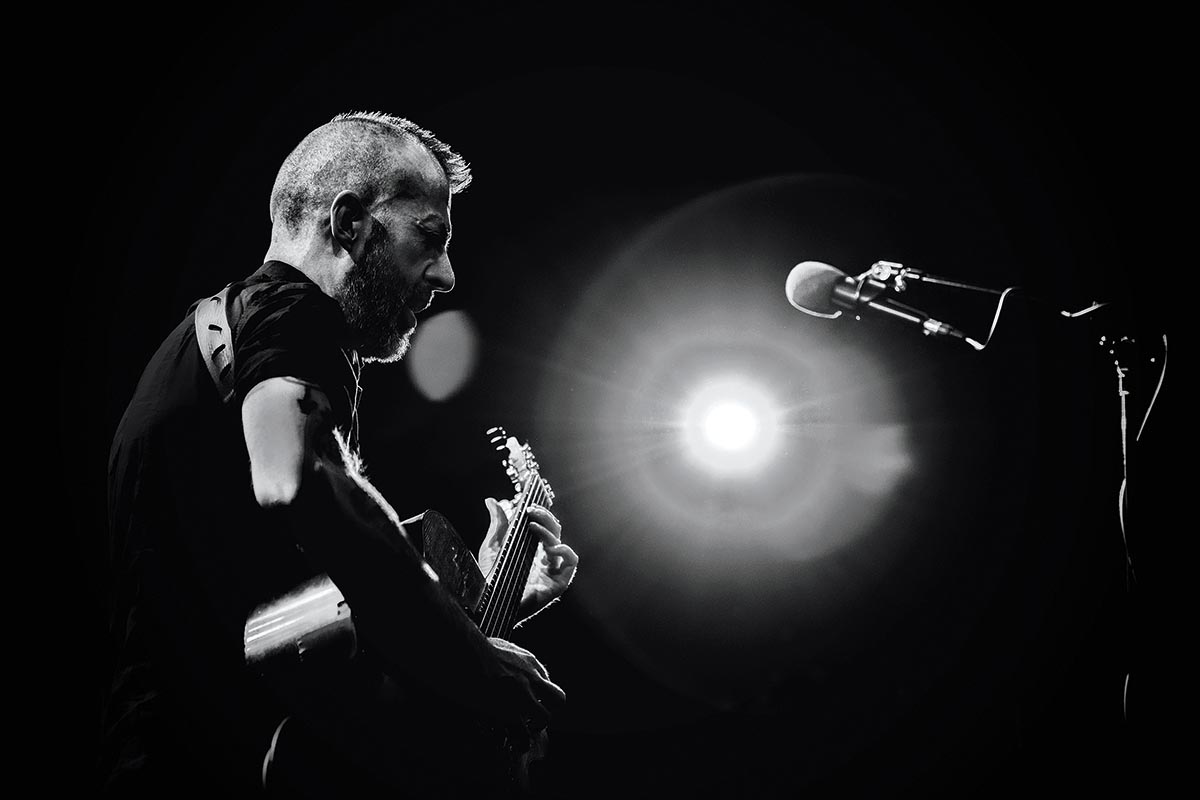
How has your approach to amplification changed?
“Back in the day, I’d be playing noisy gigs and my amplification might not have been that good – so I was beating the shit out of the guitar, putting massive cracks in the soundboard. Now I have a pedalboard with various things on it.
“The new Boss OC-5 – that’s replaced my OC-3. I use a Zoom MS-100BT MultiStomp effects pedal for really fun reverbs and delays. Then I have a TC Helicon VoiceLive 3 for guitar and vocals, and I go into a pair of Blackstar Sonnet amplifiers, which are amazing, and really cheap. I helped with the design of those.
“I’d always found there were two kinds of acoustic amp. There was the ‘electric amp in a brown box’ kind; they can be loud and really good for acoustic guitarists in a rock band. But for actually getting a realistic acoustic guitar sound, they’re awful. Then you get the more expensive hi-fi ones – and they tend to compress the sound horrifically.”
I have a TC Helicon VoiceLive 3 for guitar and vocals, and I go into a pair of Blackstar Sonnet amplifiers, which are amazing, and really cheap. I helped with the design of those
If all the trees in the world were being chopped down except one, which tonewood would you save?
“I’m wary of answering that kind of question! Because people get paradigms in their heads, and think, ‘Oh, I’ve got to have Brazilian rosewood.’ There’s a project called the Leonardo Guitar Research Project. They create pristinely recorded audio samples of guitars made from different woods and they’ll commission guitars to be made, usually using sustainable alternatives to trees that are becoming endangered.
“And they do live events where they’ll have experts go in and listen to a guitar being played, and they’re blindfolded or whatever, so they can’t see what the guitar is. And people’s desire to have Brazilian rosewood is entirely psychological. That’s the project’s findings, y’know?“
You’ve been open about your struggles with mental health. Are there any silver linings as a songwriter?
“Yeah, there are. They’re not worth it, though. I think there’s a cliché about artists in general. That artists feel things more deeply than others. I think that’s probably true in some respects. I definitely do feel things. My emotions can be really overwhelming.
“Like, an emotional response that people might normally expect to have once every few years, I can have once a week. That definitely changes the way I react to events and to the world. I can’t ignore those emotional depths. They’re there and they’re part of my life, so that goes into the music. So I think it does help in that way. But I’d rather be healthy. There’s just no doubt about it.”
There’s been plenty of debate in 2020 about streaming payment rates. Has your viral hit Passionflower been a big money-spinner?
“The way it’s helped to sell gig tickets and other stuff has been helpful financially. But in terms of actual direct income from a viral video, from royalties or advertising, no, it’s really tiny. And that’s with 17 million views. I’m not even close to living off it. Nowhere near. It’s probably five per cent of what you’d need to make a living.”
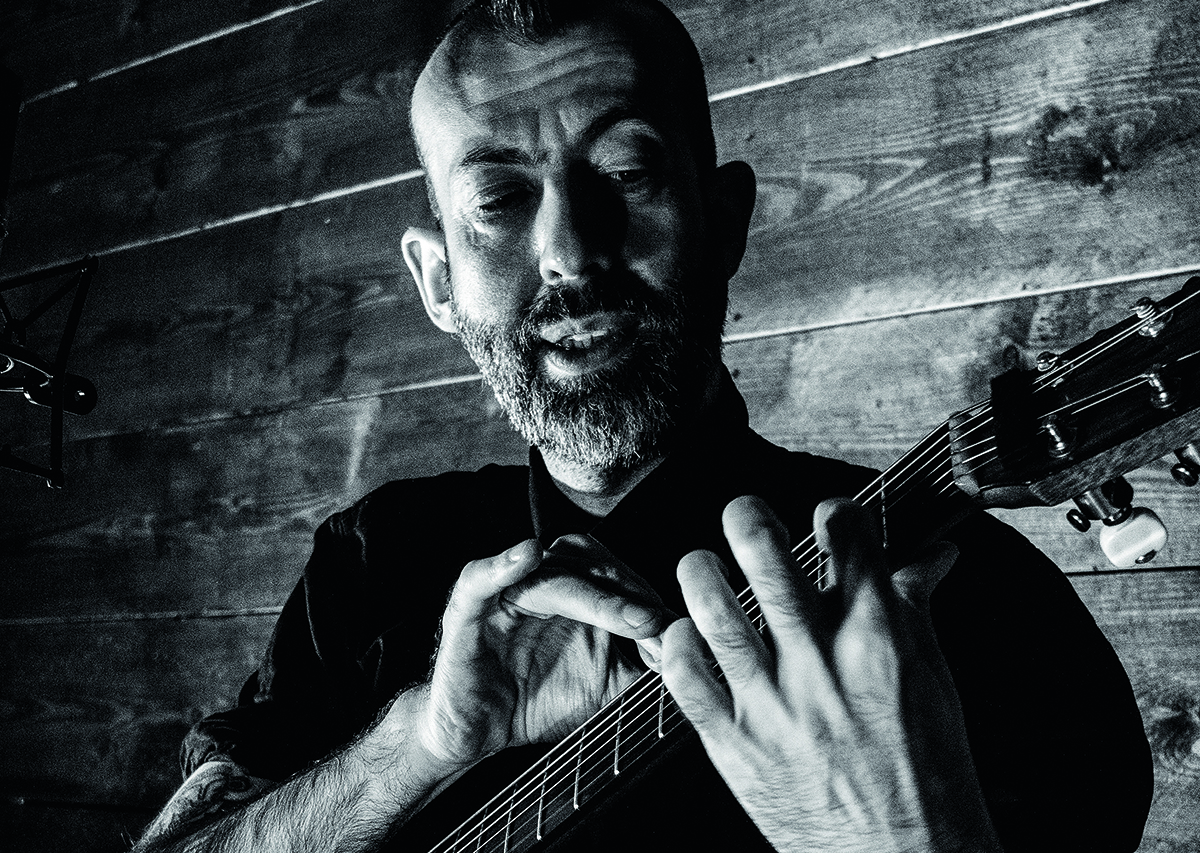
Did you set out to be a guitar revolutionary back in 2003?
“Not really. I just always liked people doing things ‘wrong’ on the guitar. My classical guitar teacher had already taught me some percussive flamenco things. But I think I was 10 when I first saw a blues guitarist doing a kind of Bukka White drumbeat, with slide, and I was just like, ‘Wow, that is so exciting.’
“It sounds so much better than you think it would. When it’s mic’d up and plugged in, it just sounds so huge. The kick drum is so deep and fat. But it was the same thing, like, the first time I heard Tom Morello with the killswitch or Jonny Greenwood do something strange with a step phaser, or Joe Satriani doing two-handed tapping pieces like Midnight.
“The first time I heard all of those different things, it was just like a ‘wow’ moment. Y’know, I spent months trying to be Stanley Jordan before realising that it’s almost impossible. You’d need to devote your life to playing that well. Which I wasn’t prepared to do, because I wanted to be able to do everything.”
Do you feel pressure that people expect technical fireworks from you?
“I definitely do feel a bit of expectation, but I don’t feel the pressure from that, particularly. I’m fairly secure in the fact that I’m a good guitarist. Or a creative guitarist. I don’t think of myself as being ‘one of the world’s greatest guitarists’ or anything like that.
If I fuck up something hard, it just makes it seem even harder, so it’s kind of a no-lose situation
“But I’m decent. Y’know, I’d watch myself, with at least curiosity, if nothing else. I’m more worried about how good my songs are and how good my voice is going to be. It doesn’t matter how crazy your technique is, the hardest thing is always playing in time and in tune.
“It’s those basic things that I worry about before a gig, more than, ‘Am I going to be able to do this eight-finger tapping?’ Because if you’re watching a circus performer on the high-wire, if they fall, it’s more exciting than if they don’t.
“If I fuck up something hard, it just makes it seem even harder, so it’s kind of a no-lose situation. I do try not to fuck up too often, but if I do, on a technical level, it’s not the end of the world. But if I come offstage thinking that I didn’t connect to the audience, I feel much more disappointed.”
- Jon Gomm's new album, The Faintest Idea, is out now on Kscope.
Henry Yates is a freelance journalist who has written about music for titles including The Guardian, Telegraph, NME, Classic Rock, Guitarist, Total Guitar and Metal Hammer. He is the author of Walter Trout's official biography, Rescued From Reality, a talking head on Times Radio and an interviewer who has spoken to Brian May, Jimmy Page, Ozzy Osbourne, Ronnie Wood, Dave Grohl and many more. As a guitarist with three decades' experience, he mostly plays a Fender Telecaster and Gibson Les Paul.

